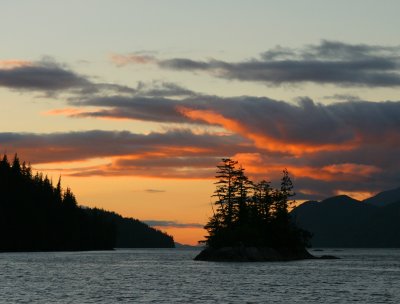This year I was astonished twice. I was astonished when I visited Alaska and saw many amazing things like the bear pictured in this page's title box, moving across a meadow at incredible speed. Then I was astonished all over again, when I returned to "civilization" and saw once again the degree to which people think they are in charge of this planet, or even of themselves.
There is nothing so amazing as human conceit in the face of nature, and nothing falsifies our conceit so quickly as a visit to a natural area, where many other animal species (let's not forget we are an animal species) happily function as though they have a rightful place on earth next to the conceited humans. Imagine that!
When I am in Alaska, sometimes I walk around in bear country, and I remind myself that bears have their own territory and rules. I accept the responsibility of finding out what the rules are, discovering what I can and cannot do. This is not a small responsibility — if I break the rules in a serious way, I will be eaten. And I might break a rule before I understand it, a significant risk in the wild.
Some of my readers will instinctively contrast my remarks about the Alaska wild with their comparatively serene, controlled lives in the bosom of civilization, but I think we should examine that distinction. How solid is the wall that separates us from the less pleasant parts of nature? Based on recent events in Louisiana (this was written in September 2005), I would say that wall is about as reliable as a typical river levee, a pile of dirt that stands as a monument to the triumph of hope over experience.
In nature, both ferocity and charity are individual acts that spring from individual choices. They are not mandated, because in a morally neutral universe (yes!) there are no mandates. In human society, by contrast ... in my view, there is no contrast. An act of charity, of self-sacrifice, is an individual choice. In times and places where there are many charitable acts by many people, one might conclude this is evidence for something larger than individual actions, something that rules us and binds us together, attaching ourselves to a basic principle like gravity. But that is a dangerous delusion.
The dangers built into the myth of society are beyond counting, here are just a few. One, it deprives individuals of credit for humane actions for which they deserve recognition as individuals, rather than as involuntary agents of "human nature." Two, it might produce behavior in people that is not sincere, based instead on the compelling illusion that this is what people must and should do. Three, some people might become a part of government based on the illusion that governments have an intrinsic right to exist, and that they can control society from the top. Most people who possess this delusion learn through experience that it isn't so.
My using the term "myth of society" is not meant to suggest that there is no human society, no binding contract between people. There really is a human society, but it is sustained, not by basic physical laws, but by individuals, and when an individual lets go of his end of the log, the entire structure may collapse.
It's easy to locate evidence for the mythical nature of society. In the early 1900s in the U.S. it was decided that alcoholic drinks were a bad thing and that society should outlaw them. If the human society most people believe in really existed, if control from the top represented a legitimate principle, then this obvious improvement in society should have taken hold. But the complete failure of this well-intentioned prohibition only demonstrated that governmental authority is mostly illusion — in truth, governments can only order people to do things they are inclined to do anyway, which begs any definition of "order."
Which brings us to the topic of New Orleans, surely the worst-located city on the planet. For those of you who don't read anything but headlines, in the early 1800s New Orleans was a logical (if not practical) location for a city, situated as it was at an important economic crossroad in the market network of the time, the mouth of the Mississippi River, which (pre-aircraft, pre-railroad) tied the entire United States of the day to vital ocean routes.
But the Mississippi River conveys, along with water, a huge amount of material to its mouth, creating a gigantic, ever-changing delta of loose soil. If the river takes a particular course, she deposits the soil along that route, until the river bottom rises and the river switches to another, more efficient route to the sea. This is not a sane location for a city, because there is no meaningful sense in which humans can control the river's route.
Our efforts to control the Mississippi would be comical if they weren't so tragic. Much of New Orleans is below sea level and even farther below the level of the river, now "contained" by levees that must be built higher and higher as time passes (because the river continues to deposit soils along its now-confined route). Since the early part of the 1900s the Mississippi has been trying to break out of its present course to follow another course, the Atchafalaya, which represents a shorter route to the sea, but the humans have been valiantly trying to keep this from happening. Why? Because if the Mississippi changed its course, the economic basis for New Orleans (as a port) would go with the river.
Today I read an estimate of the recovery cost for Hurricane Katrina's damage to New Orleans and environs: $200 billion (for Europeans reading this page, I mean $200 thousand million, or $200x10
9). This is only one of the many disasters that have befallen New Orleans over the centuries because of hurricanes and the more predictable spring floods. It is easy to see that the total cost of maintaining New Orleans in its present location is
more expensive than simply moving the entire city to a more suitable location.
Isn't this just another typical essay that suggests something utterly impractical, just to make a rhetorical point? No, not remotely! Consider:
- Estimated recovery cost for Katrina damage: $200 billion.
- Population of Greater New Orleans: about 1.4 million souls.
- Cost to pay everyone to move away: $200 billion / 1.4 million people = about $150,000 per person.
- Add the cost of a match to set fire to what is left of New Orleans.
But this is not how governments think. Governments are notoriously brainless and lacking in vision, and typically miss the long-term consequences of their decisions. Once the $200 billion has been spent and New Orleans has been restored to its prior vulnerable state, we can and should expect another Category 4/5 hurricane within a few years, and the same expensive tragicomedy will be played out. And why should we expect another powerful hurricane in the short term, considering how rare such storms have been in the past? Global warming, the global warming the present Republican administration claims doesn't exist.
And who is going to pay for this astonishingly shortsighted policy? We will. Stupidity is an expensive luxury, governments are famously stupid, but we pay the bill.
To reiterate my earlier point, human society is woven out of individual choices, not some underlying natural law. Each of us chooses to (or not to) be part of it. Governments are composed of individuals, with all the virtues and failings of individuals. And:
- Iraq is what George Bush had in mind for nature.
- Katrina is what nature had in mind for George Bush.
I'm stepping off my soapbox now. I hope you enjoy this set of Alaska adventure pages.

 Share This Page
Share This Page
 Share This Page
Share This Page


 Share This Page
Share This Page